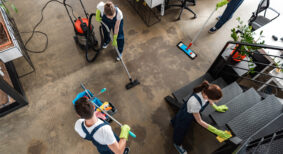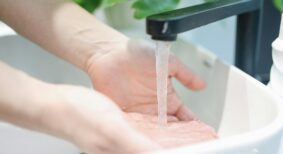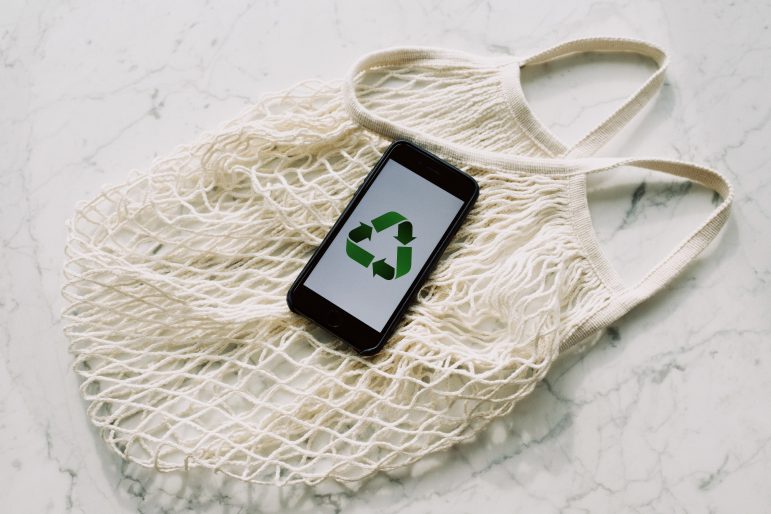The cleaning process requires a lot of resources such as chemicals, water, and energy. Although facility managers should always aim to reduce reliance on these resources, the pandemic has made this goal more urgent.
Cleaning-related consumption has skyrocketed to reduce the spread of COVID-19, and so have concerns around indoor air quality (IAQ), the long-term effects of caustic cleaning chemicals and the speed at which waste is being generated within cleaning programs. In fact, 90 per cent of respondents in a Boston Consulting Group survey said the pandemic has made them equally or more concerned about environmental issues.
Thankfully, facility managers can easily adopt simple sustainability strategies that will fulfill consumer demands while making their buildings safer and more environmentally friendly.
How sustainability supports your operation
The benefits of sustainable cleaning transcend environmental impact.
Many commercial cleaning products contain volatile organic compounds (VOCs), such as ammonia or acetone, that negatively impact IAQ. Poor IAQ negatively impacts the health of building occupants and cleaning professionals by aggravating respiratory illnesses like asthma or allergies. In fact, the Environmental Protection Agency (EPA) reports that poor IAQ causes illness and increased absences.
More importantly, consumer expectations around cleanliness will require organizations to uphold frequent and thorough cleaning. This requires more cleaning products and equipment to be shipped, stored, used, and disposed of. This amplifies the risk and damage already associated with certain cleaning chemicals and processes.
By investing in green cleaning methods and products, facility managers can better preserve human health and the environment.
Five best practices for sustainable cleaning
To create a healthier, more environmentally friendly cleaning program, consider the following recommendations:
- Simplify your chemical ingredients – For years, cleaning professionals have had to rely on products with a laundry list of ingredients, many of which aren’t environmentally friendly. Today, there are innovative ways to create effective cleaners and disinfectants using safe, sustainable ingredients. For instance, on-site generation (OSG) systems can produce electrochemically activated solutions (ECAS) using just salt, water, and electricity. ECAS clean and disinfect just as effectively as other commercial cleaning solutions but do not contain irritating fragrances, dyes, or VOCs. This makes them much safer for employees to work with and less likely to impact IAQ. Additionally, OSG systems reduce or eliminate reliance on traditional chemical shipments, which saves money and reduces greenhouse gas emissions.
- Use equipment to your advantage – While floor care processes use many chemicals and water, advancements are making this process more sustainable. Consider machines that convert water into an effective cleaning solution and greatly reduce a building’s need for traditional floor cleaners. Research demonstrates that this equipment reduces water pollution by 77 per cent, air pollution by 94 per cent, and energy usage by 97 per cent. Wall-mounted dispensers that dilute cleaning solutions can also limit product waste while durably constructed mops and other tools reduce the need for frequent replacement that drives up landfill waste.
- Consider certified service providers – Many companies claim to be dedicated to green cleaning, but how can facility managers be assured their provider’s processes are truly sustainable? This is where trusted third-party organizations can help. For example, Green Seal certifies cleaning programs based on whether they incorporate effective, sustainable cleaning and disinfecting procedures and equipment. Facility managers can more easily identify qualified service providers and have greater confidence that a cleaning program meets the highest sustainability standards.
- Prioritize training and leadership – A commitment to sustainability starts with company culture. Thus, cleaning more sustainably is only possible when staff buy into its benefits. Train your cleaning teams so they understand how to reduce waste as part of their daily routine and feel comfortable using equipment like sustainable floor care machines, chemical dispensers, OSG systems, and more. Training improves cleaning performance and consistency, which can reduce the need to reclean and use more resources. If you are working with a service provider, confirm that their approach to training and development aligns with your goals.
- Purchase environmentally sourced consumables – Significant increases in single-use personal protective equipment (PPE), disinfectant wipes, and paper towels during the pandemic have made sustainable sourcing more relevant than ever before. Consider the environmental impact of cleaning tools and paper products. Select durable, multi-use solutions like microfibre cleaning cloths, washable face coverings, and refillable spray bottles. In areas where consumables need frequent restocking, like restrooms, consider EPA-recommended toilet paper made up of 25-60 per cent post-consumer material.
Protecting people, planet, and profit
With the public much more aware of how cleanliness helps prevent the spread of illness, commercial cleaning services will continue to be in high demand.
While cleaning without generating any waste is impossible, there are ways to greatly reduce plastic, water, chemical, PPE, and energy usage. Facility managers who adapt sooner rather than later demonstrate a commitment to protecting cleaning professionals, building visitors, and the planet. At the same time, environmentally friendly solutions can have a positive impact on brand reputation and customer loyalty.
Whether overseeing cleaning in a school, office space, convention centre, or another facility, prioritizing sustainable cleaning creates a healthier, greener environment for all.
Kurt Kuempel is the General Manager of the Illinois and Wisconsin offices of GSF USA, a leading provider of cleaning services. For more information, visit www.gsf-usa.com or contact Kuempel at kkuempel@GSF-usa.com.








